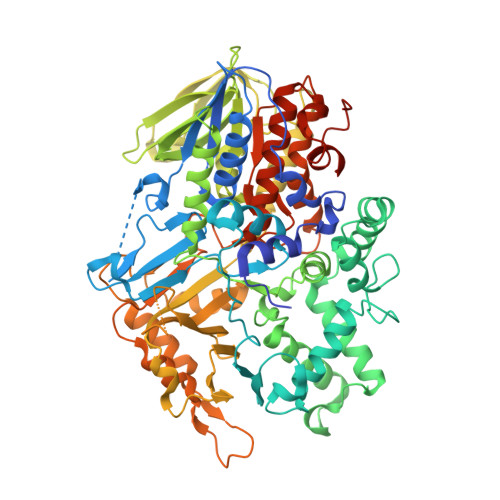Structural basis of proteolytic activation of L-phenylalanine oxidase from Pseudomonas sp. P-501.
Ida, K., Kurabayashi, M., Suguro, M., Hiruma, Y., Hikima, T., Yamomoto, M., Suzuki, H.(2008) J Biological Chem 283: 16584-16590
- PubMed: 18417467
- DOI: https://doi.org/10.1074/jbc.M800366200
- Primary Citation of Related Structures:
2YR4, 2YR5, 2YR6 - PubMed Abstract:
The mature form of l-phenylalanine oxidase (PAOpt) from Pseudomonas sp. P-501 was generated and activated by the proteolytic cleavage of a noncatalytic proenzyme (proPAO). The crystal structures of proPAO, PAOpt, and the PAOpt-o-amino benzoate (AB) complex were determined at 1.7, 1.25, and 1.35A resolutions, respectively. The structure of proPAO suggests that the prosequence peptide of proPAO occupies the funnel (pathway) of the substrate amino acid from the outside of the protein to the interior flavin ring, whereas the funnel is closed with the hydrophobic residues at its vestibule in both PAOpt and the PAOpt-AB complex. All three structures have an oxygen channel that is open to the surface of the protein from the flavin ring. These results suggest that structural changes were induced by proteolysis; that is, the proteolysis of proPAO removes the prosequence and closes the funnel to keep the active site hydrophobic but keeps the oxygen channel open. The possibility that an interaction of the hydrophobic side chain of substrate with the residues of the vestibule region may open the funnel as a putative amino acid channel is discussed.
Organizational Affiliation:
Department of Biosciences, School of Science., Graduate School of Fundamental Life Science, Kitasato University, Kitasato, Sagamihara, Kanagawa, Japan. idakoh@sci.kitasato-u.ac.jp


















